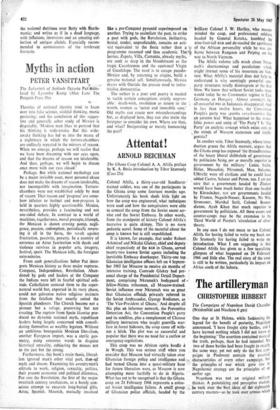The Labyrin th of Solitude Octavio Paz .trans-
Myths in action
PETER VANSITTART
lated by Lysander Kemp (Alan Lane The Penguin Press 30s)
Theories of national identity tend to foam over into fake science, wishful thinking, manic posturing; and the conclusion of this sugges- tive and generally sober study of Mexico is disputable. 'Modern man likes to pretend that his thinking is wide-awake. But this wide- awake thinking has led us into the mazes of a nightmare in which the torture-chambers are endlessly repeated in the mirrors of reason. When we emerge, perhaps we will realise that we have been dreaming with our eyes open, and that the dreams of reason are intolerable. And then, perhaps, we will begin to dream once more with our eyes closed.'
Perhaps. But while national mythology can be a major invisible asset, mere personal ukase does not make the dreams of reason intolerable, nor incompatible with imagination. Torture- chambers were not established solely by men of reason. That reason and 'progress' are some- how inferior to instinct and non-progress is held in quarters highly questionable. Mexico, nevertheless, provides a fascinating and not one-sided debate. In contrast to a world of machines, togetherness, moral precepts, triumph, the Mexican is shown craving pomp, negli- gence, passion, redemption, periodically revers- ing it all in the fiesta, the revolt against frustration, passivity, poverty. In a country of extremes an Aztec fascination with death and violence survives in popular arts, imagery, festival, sport. The Mexican kills, the foreigner exterminates.
From such generalisations Sefior Paz inter- prets Mexican history as three major ruptures. Conquest, Independence, Revolution. Aban- doned by gods and leaders at the Conquest the Indians were left in fearful spiritual soli- tude. Catholicism restored them to the super- natural world but, exported in its rusty phase, could not galvanise native religious instincts from the fatalism that exactly suited the Spanish plunderers. The Church became not a pioneer but a refuge, preserving but not creating. The rupture from Spain likewise pro- duced no dynamic national myth, republican leaders being largely concerned with consoli- dating themselves as wealthy legatees. Without an ambitious bourgeoisie Mexican liberalism, another European import, was a sterile geo- metry, using sonorous words to disguise historical unreality, subjecting the masses not to the just but the strong.
Furthermore, this book's main thesis, liberal- ism ignored man's other vital part, that-,of myth and dream. Examining his countrymen's attitude to work, religion, sexuality, politics, their present economic and political dilemmas, Paz sees the Revolution, the first of the major twentieth century revolutions, as a barely con- scious attempt to excavate long-buried gifts, Aztec, Spanish, Moorish, mutually involved
like a pre-Conquest pyramid superimposed on another. Trying to assimilate the past, to strike a pant with gods, the Revolution, instinctive, brutal, tender, unpredictable, remains an acti- vist equivalent to the fiesta rather than a programme reasoned and thus academic. Their heroes, Zapata, Villa, Carranza, already myths, are sunk as deep in the bloodstream as the tragic Cuauhtemoc and the equivocal Virgin of Guadalupe. The need is to escape pseudo- Mexico and, by returning to origins, build a genuine national self. Simultaneously, Mexico shares with Outside the prosaic need to indus- trialise, democratise.
The author is a poet and poetry is needed to tackle certain conceptions strictly unprov- able: death-wish, revolution as return to the womb, women as 'secret and immobile suns.' Old myths can create new misunderstandings but, as displayed here, they can also invite the foreigner to consider his own. Where are they, and what? Invigorating or merely humouring the past?


































 Previous page
Previous page